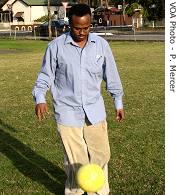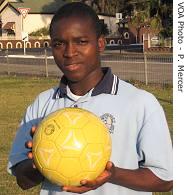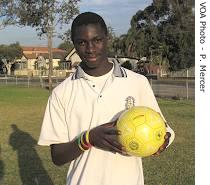2007年VOA标准英语-Soccer Camps Help Young Refugees Adapt to New L(在线收听)
Sydney
09 August 2007
A new soccer course has been set up in Sydney to help young refugees from Africa. The project, organized by the government and social workers, helps teenage boys from countries such as Sudan and Sierra Leone adapt to their new lives. Australia now resettles more refugees from Africa than from any other region. From Sydney, Phil Mercer reports.
 |
| Mohamed Baaruud |
Mohamed Baaruud himself fled persecution in Somalia and arrived in Australia after living in the United States. He now works for a government agency that helps victims of trauma and torture.
The soccer camps he runs bring together teenagers from all over the world. They all have one crucial thing in common - they all have fled persecution.
Baaruud says his young players have great potential.
"Most of the African young people are fit, very quick learners and have the potential one day to represent this great nation or be part of the European mainstream clubs like Manchester or Barcelona or Arsenal or others," he said. "So I will say I have quite good confidence in terms of the skills of the refugee young people, today they are refugees and this is the situation they're in but you never know what they'll be tomorrow."
 |
| Vassay Kamara |
"I live with my parents, my step-mum [mom] [and] dad. My mum - she['s] dead. The robber(s) kill her. Even my Grandmum, too. They kill all of them. Then the robber[s] wanted to kill my dad and we run away from Liberia," said Kamara. "We came to Guinea. We settled there, like, 10 years in the camp then God bless[ed] us and we came to Australia.
Kamara says playing football helps him learn new skills, and have fun.
Football has been a unifying force for these boys, helping them to make the often-bewildering adjustment from their old lives in Africa to life in Australia.
 |
| James |
"Little bit tough, war going on, people were homeless, the rebels destroy our houses and stuff so, was a little bit hard, yeah, but we managed to make it out to Guinea," said James.
Jasmina Bajraktarevic-Heywood, who works for a state-funded organization that offers advice and counseling to refugees, arrived in Australia as a refugee from Bosnia 14 years ago and has first-hand knowledge of the damage war can inflict. Her own hardships have convinced her that traumatized young people from Africa and beyond can prosper here.
"With adequate support I think these young people have great things to give to their new country, could be in football but it could be in many other areas. It could be in social welfare. I think there might be potential lawyers there," she said. "There might be potential, you know, engineers or chefs."
Adapting to Australia's Western lifestyle has its problems. There is racism, and also language difficulties. And simply, life in developed, peaceful Australia is very different from what the newcomers have been used to.
Football, though, is a common denominator.
Branko Culina, the Croatian-born coach of Australian football's glamour club, Sydney FC, believes the game is a powerful force for good.
"Through sport whether it be football or any other sport you can just bring all types of people together. It's something the politicians can only dream of," said Culina. "So through football in particular you can bring all of these groups together and hopefully give them the happiness and satisfaction that they desire."
And there is no shortage of ambition from the young refugees. Both Vassay and James hope to emulate the world's greatest players.
"I like to play like Ronaldhino and Robinhno, all those best players in the world. I want to be like them," both said.
Australia has significantly increased the number of African migrants it accepts, taking in just over 7,000 last year, half the country's annual total of refugees from official humanitarian programs.